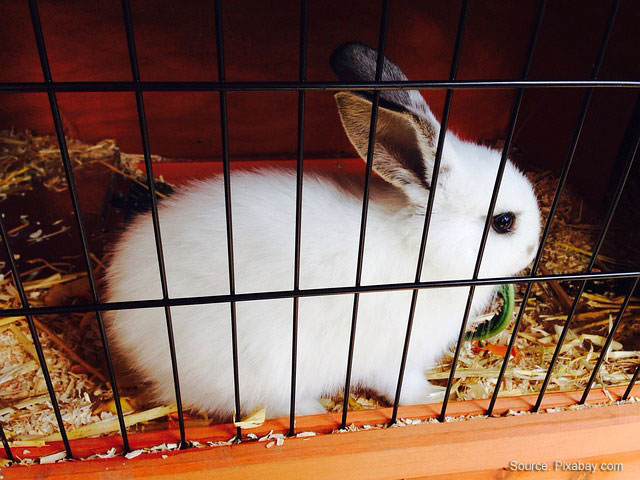For animal lovers, owning a pet is just something that can't be avoided. But what happens when you currently live in, or are moving into a small house or apartment? Even if pets are allowed, there will be certain aspects to consider when planning to give an animal a good home.
Before you make a decision to own a pet in a small living space, you should first figure out what types of animals would thrive well in tight living quarters. Don't go out and buy a Siberian Husky and expect him to be content without ample room for exercise.
With that in mind, read on for some suggestions on what type of pet to adopt (and not adopt) for your smaller home:
1. Cats
Felines are good for smaller living spaces because they are low maintenance and can take care of themselves,. Changing a litter box and filling food and water dishes are your main responsibilities when owning a cat, aside from occasionally tossing a stuffed mouse toy or string-on-a-stick. However, keep in mind that cats shed, and you'll need to clean air filters frequently when you have a cat roaming around in a small space. A few ideal breeds are: Persian, Ragdoll, Sphinx and Russian Blue.
TIP: Consider adopting an adult cat--not only will you potentially save a life, but adult cats are generally much more mellow, and do not require as much stimulation and exercises as kittens do. Keeping younger cats inside all day could result in scratched up furniture!
2. Ferrets
These furry little guys often get mixed reviews -- but they are sociable, intelligent and affectionate animals! They are also very quiet -- so you won't  have to worry about disturbing your neighbors (or roommates) with loud barking or other sounds pets often make. They don't need an extremely large cage, but they do need some space for exercise. You can even train them to use a litter box.
have to worry about disturbing your neighbors (or roommates) with loud barking or other sounds pets often make. They don't need an extremely large cage, but they do need some space for exercise. You can even train them to use a litter box.
TIP: Ferrets do best with companions, so consider buying two so they have a buddy to play with.
3. Betta fish
While you may not be able to hold them or pet them, these fish are very low maintenance pets compared to other furry four-legged friends. They thrive in warmer waters between 78 to 82 degrees, so a heater in your fish tank is best. You can also add a plant inside the tank -- not only is it pretty to look at with your colorful fish, but some plants can help keep the water clean between changes. In addition, some studies show that watching a fish swim for 15 to 20 minutes per day can help reduce stress!
TIP: When choosing your fish, make sure he or she is lively before you buy -- put your finger against the glass and move it around to see if the fish follows it (however, do not poke or tap the glass to agitate the fish).
4. Small dog breeds
If you're a dog lover and cannot imagine your life without man's best friend, it's best to stick to smaller dogs for apartment living. Medium to large dogs need a lot of room to run around, and a small apartment or home could be equivalent to a cage and cause unnecessary behavior changes. This doesn't mean that small dogs come without maintenance. Smaller dogs tend to have strict dietary needs and need to be walked frequently. If your job requires you to be gone for most of the day, this may not be the best pet option for you.
TIP: Some breeds to consider for living in compact quarters are: Bichon Frise, Chinese Crested, Pug, Cavalier King Charles Spaniel, and Yorkshire Terrier. They are small, generally low-maintenance and don't bark excessively, which can become problematic in apartments.
5. Rabbits
Since they can spend a majority of their day in a cage (one that gives them enough space to hop around a little, however), and are

quiet, rabbits can bea great low-maintenance option for apartment and small home dwellers. They are social animals, but Lop-eared rabbits are especially affectionate (though most breeds are), so you'll have plenty of cuddle time with these little guys! You can even litter box train them. They require some out-of-the-cage time that must be supervised for their exercise, and their cages should be cleaned once a week.
TIP: Look further into 'bunny proofing' your apartment before you bring your bunny home - they are curious animals and can chew through wires and carpeting if not trained properly, or if they are just bored. You don't want to lose your security deposit!
6. Reptiles
Looking for a more exotic pet option for your smaller space? First, if you're living in an apartment, check the
rules and regulations -- some exotic pets are prohibited. If you're into snakes, it's best to stick to smaller breeds that don't consume more food than you do, or require large tanks that will take up too much space in your already-cramped quarters (read: don't buy a boa constrictor for your one-bedroom apartment!). Geckos and bearded-dragons are also good options. Just remember that reptiles are cold-blooded and generally require a tank that has a regulated heat lamp, and have a diet of things like live crickets, mealworms and mice that you cannot buy in bulk ahead of time.
TIP: If you're debating on what kind of reptile to purchase, you should consider that some are diurnal, while others are nocturnal. If you're looking to watch your pet crawl around during the day rather than sleep, go with diurnal lizards, for example.